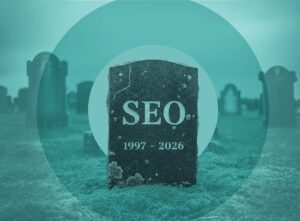
Two of the most powerful and widely used digital marketing strategy approaches are Search Engine Optimisation (SEO) and Pay-Per-Click (PPC) advertising. These two powerhouses are often pitted against each other, but the "SEO vs. PPC" debate is confusing and outdated. The reality is that for most businesses, these two potent digital marketing tactics can be far more effective if we all just get along.
So, we're calling a time-out on this debate and sharing how SEO and PPC can work together to create one of the strongest digital marketing campaigns available.
Understanding the difference between SEO and PPC
Before diving into how both SEO and PPC can complement each other, let's take a look at the core difference between SEO and pay-per-click. Both are about appearing at the top of the page on search engines, but they achieve this in fundamentally different ways.
Search Engine Optimisation (SEO)
SEO is the long-term strategy. It's focused on improving your website's visibility in organic search results on search engines. It involves a range of techniques designed to help your website rank naturally for relevant queries. This includes:
- Optimising website content
- Improving technical aspects of your site like crawlability, indexability, site speed and performance
- Building high-quality backlinks (link building is a crucial part of off-page SEO, and our Digital PR team is a dab hand at it)
The goal of SEO is to drive organic traffic to your site. So, when users conduct a search, search engines crawl and index websites, then present the most relevant and authoritative pages. Achieving a position at the top of the SERP (Search Engine Results Page) through SEO means earning that spot without paying for it.
You may have heard that “SEO is dead”, “AI is taking over”, and other doom and gloom recently. Well, here’s how we’re thinking about SEO with our very own David Westby to put your mind at ease.
Pay-Per-Click (PPC)
PPC is an advertising model. Advertisers pay a fee each time their ad is clicked. Primarily, this refers to paid search advertising, most commonly seen through Google Ads. When you run PPC campaigns, your PPC ads can appear at the top of the SERP or (much to the annoyance of some SEOs) mixed in with organic search results.
PPC marketing offers immediate visibility. You bid on targeted keywords, and if your bid is competitive and your ad is relevant, your ad can appear at the top of search engine results pages instantly. It delivers quick results, making it ideal for promotions, new product launches, or driving immediate traffic to a specific landing page. However, once you stop paying, your visibility disappears.
SEO and PPC together: A blended approach for optimal results
So, is SEO or PPC better? Well, we could pit search engine optimisation and pay-per-click campaigns together. Or give the classic “it depends” and move on with our day.
However, the real answer isn't about choosing one over the other. Instead, the most effective digital marketing strategy for long-term growth and immediate impact brings SEO and PPC together.
This blended approach allows you to maximise your reach across search engines and capture a wider range of potential customers. This is a big part of our Blended Search approach, and here's why it works.
Dominate the search landscape
While organic search through SEO builds long-term authority and provides a steady stream of organic traffic, paid search offers immediate exposure. A common misconception is that users skip paid search results in favour of organic listings. While some do, many users click on the first relevant result, regardless of whether it's a paid ad or an organic listing. In fact, almost 60% of people don't recognise Google ads when they see them.
So, by having both SEO and PPC running, you increase your chances of appearing at the top of the SERP in multiple spots, effectively dominating the search results for your key terms. SEO covers the organic visibility, and the pay-per-click marketing takes care of waiting for organic traffic to hit your pages.
It allows for data-driven decisions
You can use PPC campaigns to quickly test targeted keywords and see which converts best. However, one of the drawbacks of PPC ads is that they cost money. If you have a small budget for ads, this isn’t a long-term solution.
However, the data collected during your PPC campaign can inform your keyword research for your SEO efforts, allowing you to create content that aligns with high-performing terms. Getting rid of one of the drawbacks of SEO - the waiting game.
As your SEO efforts begin to drive more organic traffic and improve your domain authority, you might find your ad spend for certain keywords decreases in PPC, as your organic presence grows stronger. This can be the right strategy for anyone who doesn't have a huge budget for PPC but isn't sure what keywords to target with SEO. Gather the data with PPC short-term and grow with SEO in the long term.
It's an integrated strategy for business growth
When SEO and PPC marketing teams work together, they identify gaps, share insights on the constant search engine algorithm updates, and fine-tune the marketing strategy to deliver the best for your company. For small businesses, this can be particularly beneficial, as it allows for agile budget allocation, moving resources between pay-per-click campaigns and SEO as needed to seize opportunities.
Even for much larger companies, though, the blended search approach can be the right strategy. Take a look at how this approach helped Just Tyres achieve a 146% uplift in organic revenue following a website redesign.
SEO vs. PPC: Which digital marketing strategy is right for you? Why not both?
Ultimately, the question of which digital marketing strategy is right for you is best answered by considering a combined approach. The way people are searching is changing, and relying on a one-channel approach can be costly and risky.
By adopting a blended search approach, you gain the immediate visibility and testing capabilities of paid search while simultaneously building the sustainable long-term growth and authority that comes with strong organic search.
And we haven't even touched on incorporating social media, marketing automation and more into this digital marketing strategy! This approach is targeted, putting your budget where it makes sense. The blended search approach used to be a nice-to-have, but now it's a necessity. SEO, PPC and every other marketing channel need to work together to maximise profits.
Let's chat about blended search
Blended search isn't new. Our team at Aira have been using this technique for years to help grow our clients' websites, whether organically or with paid search ads. So, if you're curious about whether blended search is the right strategy for your business, let's have a chat.





